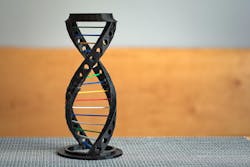FDA approves gene sequencing test
The U.S. Food and Drug Administration (FDA) has cleared for clinical lab use a gene sequencing test designed by molecular pathologists at NYU Langone Health to guide treatment decisions for patients who have received a cancer diagnosis, according to a news release from the academic medical center.
Cleared by the agency on under its 510(k) designation, the NYU Langone Genome Profiling of Actionable Cancer Targets (PACT) test detects changes in the DNA code of 607 genes linked by past studies to the development of multiple types of cancer.
PACT uses next-generation sequencing (NGS) technology, which can read the order (sequence) of the molecular “letters” making up DNA code within hundreds of genes simultaneously. NYU Langone Health contends that the test covers the most genes of any FDA-cleared NGS test to date. The technology matches the genetics of each patient’s tumor cells with a growing number of approved therapies targeted to address specific sets of cancer-causing DNA changes.
As the NYU Genome PACT test generates huge amounts of data, a bioinformatics team built a system that converts thousands of details on DNA code changes into a report for each clinician and patient on genes mutated in a given cancer sample and the implications.
The test development effort also featured a collaboration for genomic processing, interpretation, and reporting with the healthcare technology company Philips, which worked with the team to build an interface between the new test and EPIC, NYU Langone Health’s electronic medical records system. The PACT test was designed from the beginning, say the designers, to be integrated into electronic records, such that the tests can be seamlessly ordered, reviewed, and shared by a patient’s care team.
